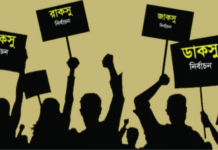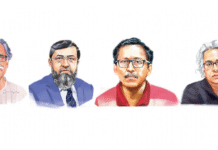TBS
Owing to an abrupt suspension of USAID operations in Bangladesh back in January, nearly 50,000 professionals were left jobless and countless community-based programmes shut down. As careers stall, and essential services disappear, the question remains: can Bangladesh’s development sector survive without international aid — and what will be lost if it doesn’t?

In January 2025, Adib Khan (pseudonym), a programme manager at an international NGO, was working under a USAID-funded project. His team had been awaiting another grant for an initiative they were eager to launch. But the world had other plans. Within days, Adib not only lost the project but also his job.
It took him five months to find another job — this time at the same organisation, but in a lower role as a senior officer.
“People like me in higher positions, who have families depending on them, took a big hit,” Adib shared.
“I was based in Dhaka with my family, but now I’ve sent them back to Mymensingh. I’m currently working on a project based in Cox’s Bazar.”
Although grateful to have secured another job, Adib admits the experience has been unsettling.
“Even though it took me a long time to get this job, I’m away from my family. My expertise lies in communication and outreach, but when corporates see my NGO background, they refuse to even consider my CV,” he mentioned.
His current project will end in November, after which his job hunt will begin again. The uncertainty looms large.
“I’m constantly anxious about what comes next,” he said.
Adib’s story reflects a larger crisis unfolding in Bangladesh’s development sector. In an unprecedented move, the White House issued an executive order on January 20, suspending USAID’s operations in over 100 countries including Bangladesh. The sudden halt of USAID funding sent shockwaves through this sector, leaving tens of thousands jobless and many more uncertain about their future.
Samia Alam, a communications lead at another international NGO, had been a year into her new role when she settled in, got her team working well together, and everything was running smoothly. Then, one night, they heard the project had been shut down, and they were no longer employed.
“It felt like the sky had fallen on my head. Ten months on, and it still feels like I’m living a nightmare,” shared Samia.
“I had to move back to my father’s house, and it has not been an easy transition. My life was going well with my job and my daughter, and now it’s all gone,” she added.
The former communications lead is a single mother and is still searching for another job with no success. Her options are limited, and she may have to change her field entirely, but in this turbulent period defined by a sluggish economy, that is not easy either.
“So many people lost their jobs, and there’s no sign of things improving anytime soon,” said Zinat Ara Afroze, Convenor of the Association of Unemployed Development Professionals (AUDP).
“Because of the USAID funding shutdown, a lot of other major donors have stepped back as well,” she added.
Zinat manages an online forum for professionals who lost their jobs due to the funding freeze. The group has become a lifeline for many, where members share job postings, networking opportunities, and words of encouragement.
“We’ve built a small community because we understand each other’s struggles,” she said.
“It felt like the sky had fallen on my head. Ten months on, and it still feels like I’m living a nightmare. I had to move back to my father’s house, and it has not been an easy transition. My life was going well with my job and my daughter, and now it’s all gone.”
Rayhan Maruf, an accounts officer who worked for 10 years at a popular INGO, has been struggling with the cancer treatments of his sick father. He is jobless for around six months. With whatever savings he had, he tried to make some luck by importing Pakistani clothes. But with such a saturated market, it has not brought him much luck while his father has not recovered yet.
He shared that the uncertainty has taken a toll on his mental health, as he worries about both his family and their future. Despite the challenges, he remains hopeful that a stable job opportunity will come his way in the future.
Other individuals made something work for them, like Samin Hossain, a development practitioner who previously worked with an international organisation as a gender specialist, now works as a freelance consultant.
“For now, I’m doing consultancy work, but I don’t know how long that will sustain me. What seems most realistic for me and my family is to leave the country eventually. Given the current circumstances, that might be the only option,” said Samin.
Ten months into the USAID shutdown, much has regressed. Around 50,000 people including public health experts, community organisers, and education specialists reportedly lost their jobs overnight. Some remain unemployed, while others have been demoted to lower ranks; while some others have turned to small businesses to survive. Many continue to hold onto hope that things will return to normal.
But the question remains: Will they?
Apart from the job cuts, the abrupt shutdown of USAID funding dealt a heavy blow to those from low-income or impoverished communities whose livelihoods depended on different projects implemented by different NGOs with the funding received from USAID.
According to ReliefWeb, these were people who helped run clinics, deliver education programmes, and support vulnerable families in some of Bangladesh’s most at-risk areas. Programmes focused on women and children have been hit the hardest. Funding for child protection has dropped by 36%, while services addressing gender-based violence have been cut by half.
These reductions have far-reaching consequences. They place more children at risk of early marriage, child labour, and exploitation, particularly as economic pressures mount. Women who once relied on safe spaces and empowerment programmes now find those services suspended or severely reduced.
The USAID shutdown has not only affected educated professionals in the development sector, it has also devastated the lives of those who depended on their work.
“As a nation, we cannot keep relying on foreign aid to provide basic needs for underprivileged people who depend on NGOs for their livelihoods and healthcare,” said Tony Michel Gomes, former Director of PR and Communications at CARE Bangladesh.
“It’s ironic that an interim government with several members coming from the NGO sector has completely disregarded it. There’s no plan to keep it afloat. Fifty thousand people and their families are facing unemployment, with no support from the government,” he continued.
According to Tony, those in senior positions are finding it especially difficult to re-enter the workforce. “The higher your position was, the harder it became to find a new job,” he added.
“Years of experience and hard-earned skills are not paying off. It’s deeply disheartening.”
The development sector in Bangladesh has long played a critical role in advancing women’s empowerment, promoting education, and addressing poverty. With the USAID funding cuts, many of these efforts are now in limbo, leaving communities without essential support, particularly women and children.
The longer the funding gap persists, the greater the risk that years of social progress will be jeopardised, pushing vulnerable communities further into hardship.
As Tony put it: “If we don’t act now, the very foundation of our development work — the belief that we can build a fairer, more equal society will be at stake.”
“The development sector, its employees and the dependables all took a big hit in the past year. If the government does not allocate any funds to address this problem and help the sector, there is no hope of it reviving,” concluded Tony.
Source: https://www.tbsnews.net/features/panorama/ripple-effect-usaid-shutdown-bangladesh-1264891









